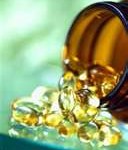 The short answer is “Yes” and I take certain supplements myself. These are in addition to a diet that includes 7-9 servings of fruits and vegetables each day, rich in antioxidants, minerals and vitamins. It is important to emphasize that supplements are not intended to be used as dietary substitutes.
The short answer is “Yes” and I take certain supplements myself. These are in addition to a diet that includes 7-9 servings of fruits and vegetables each day, rich in antioxidants, minerals and vitamins. It is important to emphasize that supplements are not intended to be used as dietary substitutes.
Recommended Supplements.
1) A broad-spectrum daily Multivitamin such as One A Day Men’s or One A Day Women’s Health Formula. These contain all the basic vitamins and essential minerals as well as Iron in the case of the Women’s Formula and Lycopene for prostate health in the Men’s Formula.
2) Vitamin D-3 The simplest way to obtain Vitamin D is to make it ourselves by exposure to sunlight but most people are afraid of overexposure so they wear sunblock or do not expose themselves to the sun. As a result, a great majority of Americans are Vitamin D deficient, even in the sunshine states (1). Principal dietary sources of Vitamin D are cod liver oil, herring, salmon, mackerel and sardines, with cod liver oil being the richest source, provided that the Vitamin D has not been removed during processing. Alternatively, one can supplement with Vitamin D-3 (Cholecalciferol) and especially during the winter months when the daylight time is less. Dr. Michael Holick of Boston University recommends supplementation with up to 2,000 International Units (IU) per day (2), Dr. Mark Hyman recommends 5,000-10,000 IU per day (3) and Dr. Mercola advises 35 IU for every pound of body weight (4) which translates into approximately 1,000 IU for every 30 pounds. This is clearly much more than the 400 IU of Vitamin D present in the Multivitamin supplement, which is considered enough to ward off rickets.
There is growing evidence to suggest that Vitamin D is involved in many important bodily processes in addition to the maintenance of bone integrity through promoting the absorption and retention of calcium and phosphate (5, 6). Vitamin D helps the body to make its own natural antibiotics called antimicrobial peptides, which can help combat certain bacterial, viral and fungal infections and may protect against influenza (7). It is also important in counteracting seasonal affective disorder, depression and dementia. Data analyses published in 2007 found that supplementation with Vitamin D was associated with a statistically significant 7% reduction in mortality from all causes, an astonishing result (8,9). For more detailed information on Vitamin D, the Office of Dietary Supplements of the U.S. National Institutes of Health has compiled an online review (10)
3) Omega 3 Essential Fatty Acids, DHA from microalgae or EPA and DHA from fish or krill oil. It is important that the oil be purified in order to remove any contamination with heavy metals and other chemical residues.
The current view is that we should aim for a balance in our dietary intakes of Omega 3 and Omega 6 essential fatty acids (11). We need both types but our modern diet rich in corn, soy and safflower oils has shifted this ratio strongly in favor of Omega 6 fatty acids. These compounds lead to the production of substances that promote blood clotting, inflammation and cell division, absolutely necessary in wound healing and tissue repair. However, too much blood clotting, inflammation and cell division can be associated with serious health problems and so a balance needs to be struck. That’s where Omega 3 fatty acids come in. They lead to the production of substances that reduce blood clotting, inflammation and cell division so these processes are kept in balance.
Furthermore, the Omega 3 fatty acid DHA is an important constituent of cell membranes and is the most abundant fat in the brain. It is essential for structural integrity and overall brain health. A deficiency in Omega 3 fatty acid levels has been linked to anxiety, depression, criminal behavior, autism, attention deficit disorder, learning disabilities and dementia (3).
4) Glutathione. One of the most important detoxifying substances and antioxidants in the body is sulfur-rich Glutathione and our ability to produce it declines by approximately 10% for every decade after age 20. Such a reduction in Glutathione levels would leave us more susceptible to toxins as we get older and this would compound the aging process. Therefore we need to strengthen our ability to make Glutathione. We cannot absorb it as a supplement but we can stimulate its biosynthesis by taking N-Acetyl Cysteine and Alpha Lipoic Acid. We can also make sure that we eat adequate amounts of sulfur-containing vegetables such as asparagus, Brussels sprouts, cabbage, chard, kale, garlic and onions.
© Christopher J. Jones, M.Sc., Ph.D.
References
1) Holick, M. F. (2006) Vitamin D Deficiency. N. Eng. J. Med. 357 (3), 266-281.
2) Holick, M. F. (2004) Sunlight and Vitamin D for Bone Health and Prevention of Autoimmune Diseases, Cancers and Cardiovascular Disease. Am. J. Clin. Nutr. (80) Suppl: 1678S-1688S.
3) Hyman, M. (2008) The Ultramind Solution. Scribner, New York. Pp. 447.
4) Mercola, J. (2009) How Much Vitamin D Do You Really Need to Take? http://articles.mercola.com/sites/articles/archive/2009/10/10/Vitamin-D-Experts-Reveal-the-Truth.aspx
5) Vitamin D Council (2010) Understanding Vitamin D Cholecalciferol. http://www.vitamindcouncil.org
6) Mercola, J. (2009) Important New vitamin D Research Papers. http://articles.mercola.com/sites/articles/archive/2009/12/01/Important-New-Vitamin-D-Research-Papers.aspx
7) Crews, M. R. (2009) Does Vitamin D Offer Natural Flu Prevention? http://vitamins-minerals.suite101.com/article.cfm/does_vitamin_d_offer_natural_flu_prevention
8) Autier, P. & Gandini, S. (2007) Vitamin D Supplementation and Total Mortality: A Meta-Analysis of Randomized Control Trials. Arch. Intern. Med. 167: 1730-1737.
9) Giovannucci E. (2007) Can Vitamin D Reduce Total Mortality? Arch. Intern. Med. 167:1709-10.
10) Office of Dietary Supplements, National Institutes of Health (2009) Dietary Supplement Fact Sheet: Vitamin D. http://ods.od.nih.gov/factsheets/vitamind.asp
11) Weil, A. (2000) Eating Well For Optimum Health. Alfred A. Knopf, New York, pp. 307.




Comments on this entry are closed.